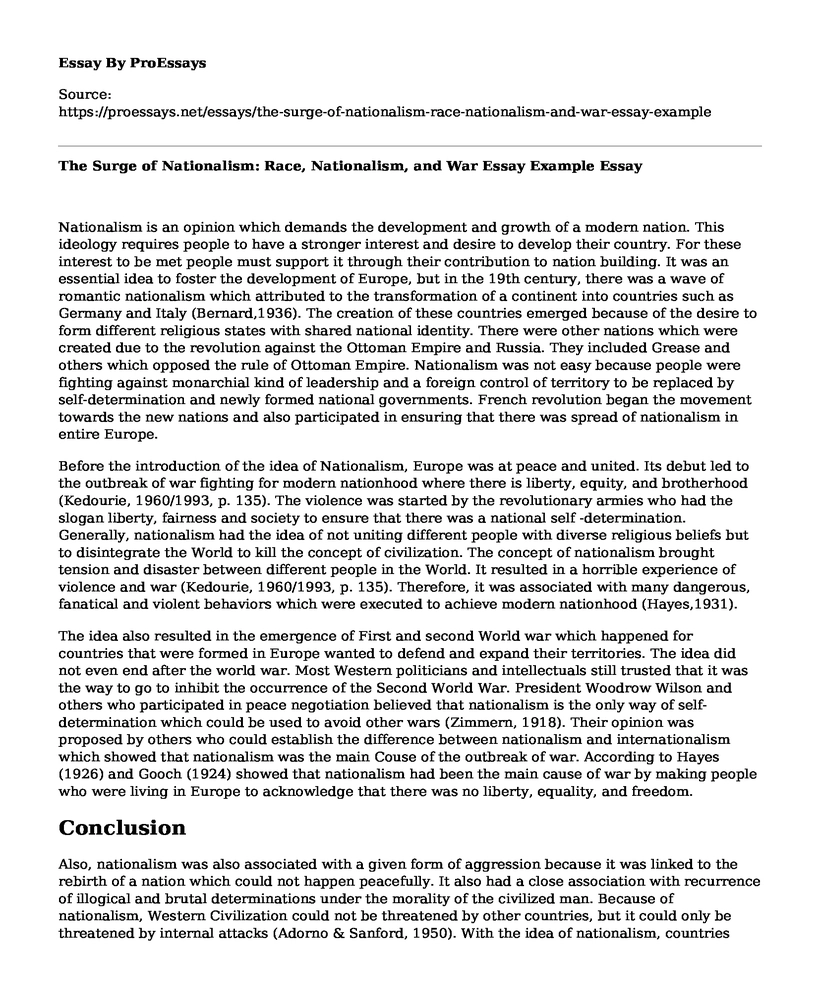Nationalism is an opinion which demands the development and growth of a modern nation. This ideology requires people to have a stronger interest and desire to develop their country. For these interest to be met people must support it through their contribution to nation building. It was an essential idea to foster the development of Europe, but in the 19th century, there was a wave of romantic nationalism which attributed to the transformation of a continent into countries such as Germany and Italy (Bernard,1936). The creation of these countries emerged because of the desire to form different religious states with shared national identity. There were other nations which were created due to the revolution against the Ottoman Empire and Russia. They included Grease and others which opposed the rule of Ottoman Empire. Nationalism was not easy because people were fighting against monarchial kind of leadership and a foreign control of territory to be replaced by self-determination and newly formed national governments. French revolution began the movement towards the new nations and also participated in ensuring that there was spread of nationalism in entire Europe.
Before the introduction of the idea of Nationalism, Europe was at peace and united. Its debut led to the outbreak of war fighting for modern nationhood where there is liberty, equity, and brotherhood (Kedourie, 1960/1993, p. 135). The violence was started by the revolutionary armies who had the slogan liberty, fairness and society to ensure that there was a national self -determination. Generally, nationalism had the idea of not uniting different people with diverse religious beliefs but to disintegrate the World to kill the concept of civilization. The concept of nationalism brought tension and disaster between different people in the World. It resulted in a horrible experience of violence and war (Kedourie, 1960/1993, p. 135). Therefore, it was associated with many dangerous, fanatical and violent behaviors which were executed to achieve modern nationhood (Hayes,1931).
The idea also resulted in the emergence of First and second World war which happened for countries that were formed in Europe wanted to defend and expand their territories. The idea did not even end after the world war. Most Western politicians and intellectuals still trusted that it was the way to go to inhibit the occurrence of the Second World War. President Woodrow Wilson and others who participated in peace negotiation believed that nationalism is the only way of self-determination which could be used to avoid other wars (Zimmern, 1918). Their opinion was proposed by others who could establish the difference between nationalism and internationalism which showed that nationalism was the main Couse of the outbreak of war. According to Hayes (1926) and Gooch (1924) showed that nationalism had been the main cause of war by making people who were living in Europe to acknowledge that there was no liberty, equality, and freedom.
Conclusion
Also, nationalism was also associated with a given form of aggression because it was linked to the rebirth of a nation which could not happen peacefully. It also had a close association with recurrence of illogical and brutal determinations under the morality of the civilized man. Because of nationalism, Western Civilization could not be threatened by other countries, but it could only be threatened by internal attacks (Adorno & Sanford, 1950). With the idea of nationalism, countries started to defend and protect their territories for external attacks. Therefore, nationalism is a surge for war, racism, and others barbaric acts.
Work Cited
Adorno, T. W., Frenkel-Brunswik, E., Levinson, D. J., & Sanford, R. N. (1950). The authoritarian personality. New York, NY: Harper & Row.
Bernard, L. L. (1936). The conflict between primary group attitudes and derivative group ideals in modern society. American Journal of Sociology, 41, 611-623. doi:10.1086/217258Hayes, C. J. H. (1926). Essays on nationalism. New York, NY: Macmillan.Hayes, C. J. H. (1931). The historical evolution of modern nationalism. New York, NY: Macmillan.
Kedourie, E. (1993). Nationalism (4th ed.). Oxford, United Kingdom: Blackwell. (Original work published 1960)
Gooch, G. P. (1924). The teaching of history in relation to world citizenship. In J. H. Whitehouse & G. P. Gooch (Eds.), Wider aspects of education (pp. 1-23). Cambridge, United Kingdom: Cambridge University Press.
Zimmern, A. E. (1918). Nationality and government. London, United Kingdom: Chatto & Windus.
Cite this page
The Surge of Nationalism: Race, Nationalism, and War Essay Example. (2022, Oct 23). Retrieved from https://proessays.net/essays/the-surge-of-nationalism-race-nationalism-and-war-essay-example
If you are the original author of this essay and no longer wish to have it published on the ProEssays website, please click below to request its removal:
- Research Paper on Fair Housing Act
- A Change in Mental Health Policy - Paper Example
- The Significance of Using Risk Communications as a Public Health Leader - Paper Example
- Global Governance and International Institutions Essay
- Essay on Michael Kuo: Resisting Myths, Confronting Challenges, Finding a Savior
- Free Report on Public Administration Insights: Policy, Performance, and Theory
- Essay Sample on Influence of Evolving Societies on Human Relationships







